In the previous article, we mentioned that learning HTML5 requires knowledge of CSS. When designing the page, you need to know the layout and structure of the Html5 page. To achieve a very gorgeous and beautiful interface, you need to use CSS. Let's first review the basic usage of CSS2, and then look at the relationship and difference with CSS3.
1. What is css?
Cascading stylesheet (cascading stylesheet) provides expression form for web pages. According to W3C specifications, when designing a web page, the data and structure of the web page should be written in the html file, the appearance of the web page should be written in the css file, and the behavior of the web page should be written in the .js file. The purpose of this is to separate the data, appearance, and behavior of the web page to facilitate code maintenance.
2. CSS selector:
(1) Tag selector (simple selector)
(2) Class selector
.s1{
属性名:属性
}There is also a class selector with a name, as follows:
div.s1{
font-size;120px;
}(3) id selector
#d1{
font-size:italic;
font-weight:900;
}(4) Selector grouping
h1,h2,h3{ //用逗号隔开
<span style="white-space:pre"> </span>color:bllue;
}(5) Selection Derived
#d2 p{
span style="white-space:pre"> </span>color:red;
font-size:300;
}Comments in CSS
/* */
Priority of style:
External style, write the style in .css Two key attributes in CSS: (1) display attribute has three values: none Do not display (2) The position attribute Commonly used attributes are as follows: The above is a basic summary of the css we have learned before. Let’s take a look at the characteristics of css3. Open it first css3 reference manual (download address: http://download.csdn.net/detail/lxq_xsyu/6784027) First look at border-color setting border Related attributes: border-top- color,border-right-color,border-bottom-color,border-left-color This setting border is only supported on the Firefox browser, and the running effect You can see from the css3.0 reference book that css3 adds a lot of style attributes. We can refer to this manual to create a more gorgeous interface effect than css2. If we cooperate with js, we can also realize page animation production. Let’s take a look at creating a rounded corner effect for interface elements In order to achieve this effect in css2, we need to create two pictures. The code is as follows: Although the above method solves the problem, it adds a redundant tag. Let’s see how to solve it using css3: Above It's Xiaoqiang's HTML5 mobile development road (4) - the content of CSS2 and CSS3. For more related content, please pay attention to the PHP Chinese website (www.php.cn)!
Internal style in the file, write the style in the .html file
Inline style, write the style inside style=" "
When a conflict occurs: external style
block by block Display the mark as a mark
inline Display the mark as an inline mark <html>
<!--display属性-->
<head>
<style>
#d1{
width:200px;
height:100px;
background-color:red;
color:white;
font-size:40px;
display:inline; <!--改为行内标记-->
}
#d2{
width:200px;
height:100px;
background-color:blue;
color:white;
font-size:40px;
display:inline; <!--改为行内标记-->
}
</style>
</head>
<body>
<div id="d1">hello1</div>
<!--标记d2会另起一行显示-->
<div id="d2">hello2</div>
</body>
</html>
has three values:
static:Default value. The browser will place the tags in the default way (left-right, top-bottom).
Absolute: Offset relative to the parent mark (the mark where it is located).
relative: First place it in the default way, and then offset it. (1)文本相关的属性
font-size:30px; //字体大小
font-style:normal(正常)/italic(斜体)
font-weight:800; //100-900 (粗细)
font-family:"宋体"; //字体
text-align:left/center/right; //文本水平对齐方式
line-height:30px; //行高 一般和容器的高值相同放在中间
cursor:pointer/wait; //光标的形状
(2)背景相关的属性
background-color:red; //背景颜色
background-color:#88eeff; //RGB格式颜色设置
background-color:rgb(100,100,100); //可以用这种格式输入十进制数的颜色值
background-image:url(images/t1.jpg); //背景图片
background-repeat:no-repeat/repeat-x/repeat-y; //平铺方式
background-position:30px 20px; //(水平和垂直)背景位置
background-attachment:scroll(默认)/fixed; //依附方式
也可以同时设置背景的多个特性:
background:背景颜色 背景图片 平铺方式 依附方式 水平位置 垂直位置;
(3)边框
border-left:1px solid red;
border-right:2px dotted black;
border-bottom:
border-top:
border:1px solid red;
(4)定位
width:100px;
height:200px;
margin //外边距
margin-left:20px;
margin-right:30px;
margin-top:40px;
margin-buttom:50px;
可以简化为:margin:top right bottom left;
margin:40 30 50 20;
padding //内边距
padding-left:
padding-right:
padding-top:
padding-buttom:
可以简化为:padding:top right bottom left;
内边距会将父标记撑开
(5)浮动
取消标记独占一行的特性
float:left/right; //向左,向右浮动
clear:both; //清除浮动的影响
(6)其他
list-style-type:none;除掉列表选项的小圆点。
text-decoreation:underline; //给文本加下划线
(7)连接的伪样式
a:link{color:red} 没有访问时
a:visited{color:blue} 鼠标放上时
a:action{color:green} 鼠标点击时
a:hover{color:yellow} 鼠标离开时<!DOCTYPE html PUBLIC "-//W3C//DTD XHTML 1.0 Strict//EN" "http://www.w3.org/TR/xhtml1/DTD/xhtml1-strict.dtd">
<html xmlns="http://www.w3.org/1999/xhtml">
<head>
<meta http-equiv="Content-Type" content="text/html; charset=utf-8" />
<meta http-equiv="Content-Language" content="utf-8" />
<meta name="robots" content="all" />
<meta name="author" content="Tencent-ISRD" />
<meta name="Copyright" content="Tencent" />
<title>Border-color</title>
<style>
div{
border: 8px solid #000;
-moz-border-bottom-colors: #555 #666 #777 #888 #999 #aaa #bbb #ccc;
-moz-border-top-colors: #555 #666 #777 #888 #999 #aaa #bbb #ccc;
-moz-border-left-colors: #555 #666 #777 #888 #999 #aaa #bbb #ccc;
-moz-border-right-colors: #555 #666 #777 #888 #999 #aaa #bbb #ccc;
padding: 5px 5px 5px 15px;
}
</style>
</head>
<body>
<div>在Firefox浏览器里能看到边框颜色渐变效果</div>
</body>
</html>
<html>
<head>
<style type="text/css">
a{
display:block;
height:40px;
float:left;
font-size:1.2em;
padding-right:0.8em;
background:url(images/headerRight.png) no-repeat scroll top right;
}
a span{
background:url(images/headerLeft.png) no-repeat;
display:block;
line-height:40px;
padding-left:0.8em;
}
</style>
</head>
<body>
<a href="#"><span>Box Title</span></a>
</body>
</html><html>
<head>
<style type="text/css">
a{
float:left;
height:40px;
line-height:40px;
padding-left:0.8em;
padding-right:0.8em;
border-top-left-radius:8px;
border-top-right-radius:8px;
background-image:url(image/headerTiny.png);
backgrount-repeat:repeat-x;
}
</style>
</head>
<body>
<a href="#"><span>Box Title</span></a>
</body>
</html>
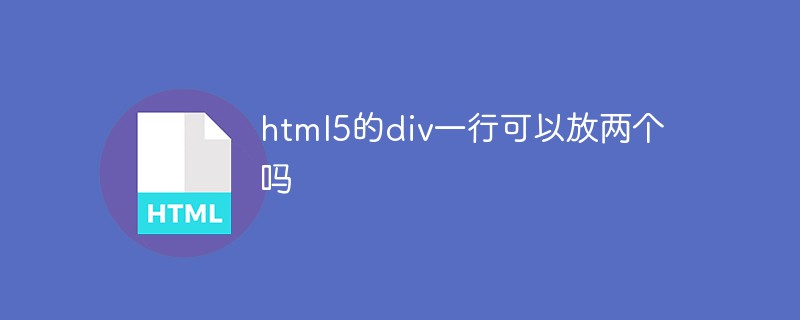 html5的div一行可以放两个吗Apr 25, 2022 pm 05:32 PM
html5的div一行可以放两个吗Apr 25, 2022 pm 05:32 PMhtml5的div元素默认一行不可以放两个。div是一个块级元素,一个元素会独占一行,两个div默认无法在同一行显示;但可以通过给div元素添加“display:inline;”样式,将其转为行内元素,就可以实现多个div在同一行显示了。
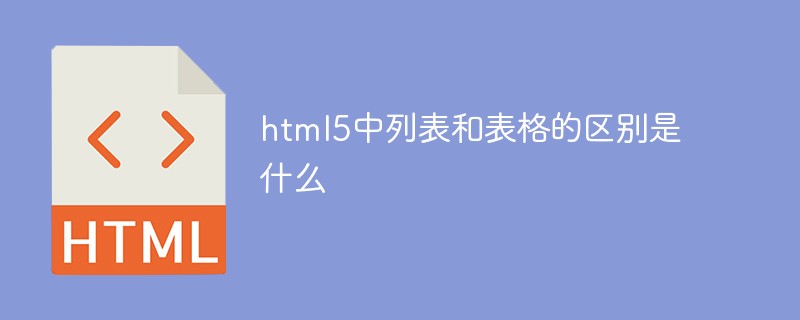 html5中列表和表格的区别是什么Apr 28, 2022 pm 01:58 PM
html5中列表和表格的区别是什么Apr 28, 2022 pm 01:58 PMhtml5中列表和表格的区别:1、表格主要是用于显示数据的,而列表主要是用于给数据进行布局;2、表格是使用table标签配合tr、td、th等标签进行定义的,列表是利用li标签配合ol、ul等标签进行定义的。
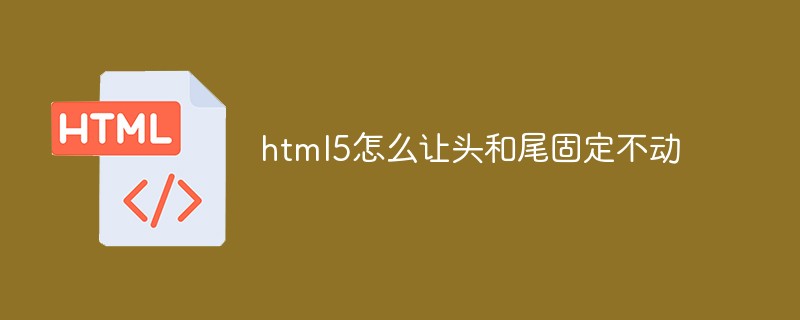 html5怎么让头和尾固定不动Apr 25, 2022 pm 02:30 PM
html5怎么让头和尾固定不动Apr 25, 2022 pm 02:30 PM固定方法:1、使用header标签定义文档头部内容,并添加“position:fixed;top:0;”样式让其固定不动;2、使用footer标签定义尾部内容,并添加“position: fixed;bottom: 0;”样式让其固定不动。
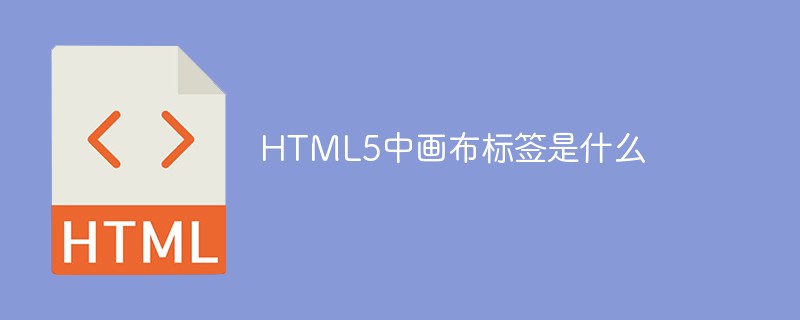 HTML5中画布标签是什么May 18, 2022 pm 04:55 PM
HTML5中画布标签是什么May 18, 2022 pm 04:55 PMHTML5中画布标签是“<canvas>”。canvas标签用于图形的绘制,它只是一个矩形的图形容器,绘制图形必须通过脚本(通常是JavaScript)来完成;开发者可利用多种js方法来在canvas中绘制路径、盒、圆、字符以及添加图像等。
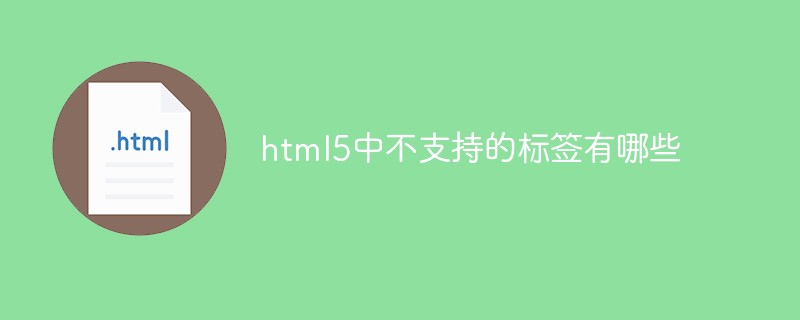 html5中不支持的标签有哪些Mar 17, 2022 pm 05:43 PM
html5中不支持的标签有哪些Mar 17, 2022 pm 05:43 PMhtml5中不支持的标签有:1、acronym,用于定义首字母缩写,可用abbr替代;2、basefont,可利用css样式替代;3、applet,可用object替代;4、dir,定义目录列表,可用ul替代;5、big,定义大号文本等等。
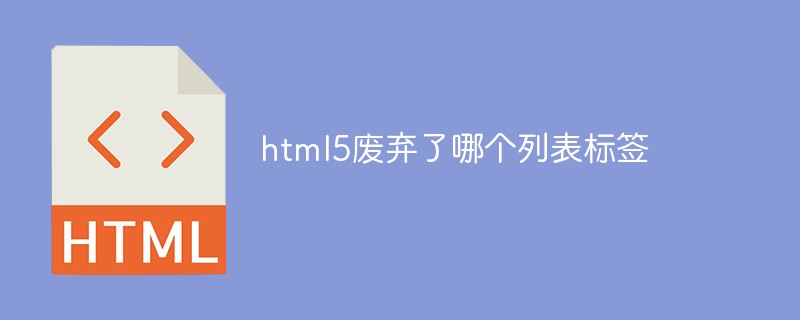 html5废弃了哪个列表标签Jun 01, 2022 pm 06:32 PM
html5废弃了哪个列表标签Jun 01, 2022 pm 06:32 PMhtml5废弃了dir列表标签。dir标签被用来定义目录列表,一般和li标签配合使用,在dir标签对中通过li标签来设置列表项,语法“<dir><li>列表项值</li>...</dir>”。HTML5已经不支持dir,可使用ul标签取代。
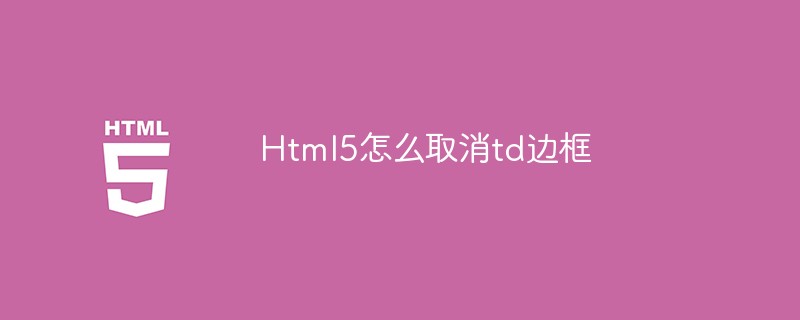 Html5怎么取消td边框May 18, 2022 pm 06:57 PM
Html5怎么取消td边框May 18, 2022 pm 06:57 PM3种取消方法:1、给td元素添加“border:none”无边框样式即可,语法“td{border:none}”。2、给td元素添加“border:0”样式,语法“td{border:0;}”,将td边框的宽度设置为0即可。3、给td元素添加“border:transparent”样式,语法“td{border:transparent;}”,将td边框的颜色设置为透明即可。
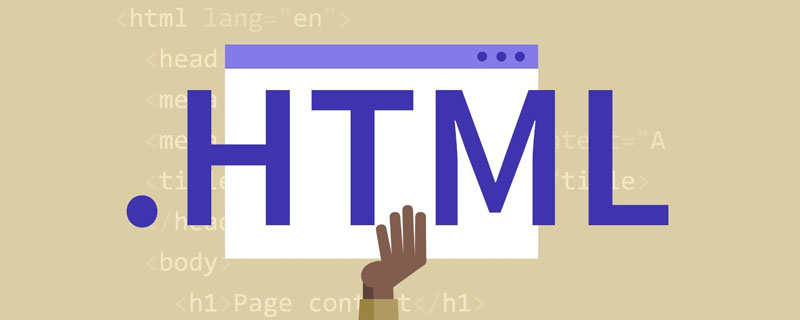 html5是什么意思Apr 26, 2021 pm 03:02 PM
html5是什么意思Apr 26, 2021 pm 03:02 PMhtml5是指超文本标记语言(HTML)的第五次重大修改,即第5代HTML。HTML5是Web中核心语言HTML的规范,用户使用任何手段进行网页浏览时看到的内容原本都是HTML格式的,在浏览器中通过一些技术处理将其转换成为了可识别的信息。HTML5由不同的技术构成,其在互联网中得到了非常广泛的应用,提供更多增强网络应用的标准机。


Hot AI Tools

Undresser.AI Undress
AI-powered app for creating realistic nude photos

AI Clothes Remover
Online AI tool for removing clothes from photos.

Undress AI Tool
Undress images for free

Clothoff.io
AI clothes remover

AI Hentai Generator
Generate AI Hentai for free.

Hot Article

Hot Tools

Atom editor mac version download
The most popular open source editor

mPDF
mPDF is a PHP library that can generate PDF files from UTF-8 encoded HTML. The original author, Ian Back, wrote mPDF to output PDF files "on the fly" from his website and handle different languages. It is slower than original scripts like HTML2FPDF and produces larger files when using Unicode fonts, but supports CSS styles etc. and has a lot of enhancements. Supports almost all languages, including RTL (Arabic and Hebrew) and CJK (Chinese, Japanese and Korean). Supports nested block-level elements (such as P, DIV),

SublimeText3 Linux new version
SublimeText3 Linux latest version

VSCode Windows 64-bit Download
A free and powerful IDE editor launched by Microsoft

ZendStudio 13.5.1 Mac
Powerful PHP integrated development environment






